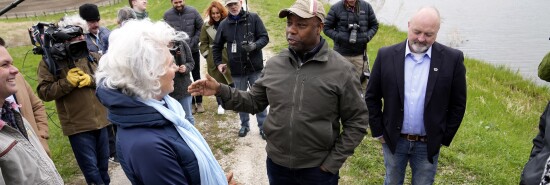
Hearing Tim Scott run the policy gamut is a treat
Quin Hillyer
Video Embed
Sen. Tim Scott (R-SC), the potential presidential candidate, has a reputation as more of a “people person” than a policy wonk, but in an exclusive policy-heavy phone interview Wednesday, he sounded as enthusiastically detail-oriented as any think tank scholar-advocate.
Scott, the ranking Republican on the Banking Committee, co-introduced two key bills this week on Mexican border policy. The first, one of the bipartisan efforts for which he has become renowned, is (by the committee’s description) “a sanctions and anti-money laundering bill to help combat the country’s fentanyl crisis by targeting opioid traffickers” and cartels.
“We’ve lost 70 thousand American lives to fentanyl,” he said, including the son of a close friend of his. “We have to stop the illicit flow of fentanyl across our southern border.” The bill introduced April 25 “freezes the assets” of cartels. In the bill, “we tackle both the Chinese precursors as well as the Mexican distributors and the labs in Mexico. We have to … use our sanctions ability to push back forcefully on them.”
Scott followed on April 26 with a bill that would redirect money from the IRS to Border Patrol forces. Of the $80 billion in new IRS funding passed last year by Democrats despite unified Republican opposition, Scott would take back the $45 billion the Democrats had targeted specifically for added tax enforcement and harassing audits.
“When you see 6 million-plus illegal border crossings … and 100-plus people showing up at our border who are on our national watch list … from all over the world including the Middle East and China, we should not scratch our heads; we should secure our border,” Scott said. “Why in the world would be spend $45 billion hiring 87,000 new IRS agents when we should be hiring more Border Patrol agents? If you don’t control your border, you don’t control your county, [just as] if you don’t control the back door of your house, you don’t control your house.”
This is a better use of the money, he said, than “targeting American citizens and treating them like tax cheats.”
As an aside, Scott showed a flash of humor here. He caught himself saying “treating them like tax treats” before immediately laughing at his own alliterative stumble and correcting himself: “Tax cheats, I should say, but treats for the federal government!”
But it was in response to a more open-ended question about “policy proposals that are new or different” that Scott really got going like a think tank wonk, especially from a banking standpoint:
New legislation called “Road to Housing” that attacks regulatory hurdles to home ownership. “Opportunity Zones 2.0,” which builds on the huge, now-independently documented success of the opportunity zone law he personally spearheaded to passage in 2017 to promote private-sector investment in low-income areas. The new “Zone” approach is designed to repatriate production of essentials such as medicine so the U.S. won’t be “wholly dependent on our adversaries,” such as China, for domestic supplies. Continued expansion of school choice, including for Title II “kids with special needs.” And so on through what he calls his entire “opportunity agenda.”
Switching to foreign and defense policy, Scott cited President Ronald Reagan’s “peace through strength” approach as a model, and he said we must “prepare to have the most lethal military on God’s green earth.” That means we need greater “ability to recruit and attract people to our military,” which means “quit using our military for social experimentation,” which has “distracted from our mission.” And he slammed President Joe Biden for pushing defense budgets that don’t even keep up with inflation.
With interview time at a premium, I cut Scott off to move to the cultural issues now roiling the public square. “How does someone go about reversing the Left’s toxic, race-based, and gender-based takeover of so many institutions,” I asked, “while still reassuring people in the middle that, yes, of course we want to oppose racism and other forms of bigotry?”
“Well,” he answered, in a deadpan voice, “I think it takes a change of leadership. I’d recommend somebody, you know, a 57-year-old South Carolinian or something like that.”
After laughing, Scott launched into one of those homages to America that have been his trademark: “You can look back at the last 50 years in the world … and America tells the story best. We’ve had more progress in this nation in the last 50 years than any other place on Earth. What we have to do is actually sell the progress that we have been making.”
The “radical Left,” he said, “are literally — uh, that’s not true — they are figuratively poisoning the minds of the American kids by saying we live in an evil country. We have to rebuke that and tell the truth that, yes, we have an original sin, but the story of America is the story of redemption.”
There was much more along those inspirational lines, but for those of us who love language, just hearing a public figure, without prompting, self-correct his use of “literally” was itself a treat (not a cheat).
Scott ended, “For us to continue to make progress is to focus on American exceptionalism and having all avenues toward the dream open for all citizens … but you cannot pollute the airwaves telling us that we have to cancel our Founding Fathers as opposed to celebrating who we are as Americans.”
